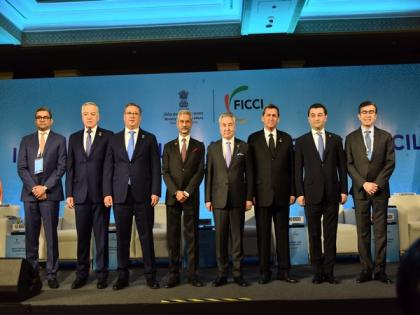Jaishankar lays out growth opportunities in India to visiting Central Asian leaders
By ANI | Updated: June 5, 2025 20:08 IST2025-06-05T20:03:06+5:302025-06-05T20:08:13+5:30
New Delhi [India], June 5 : External Affairs Minister S Jaishankar, in the presence of leaders of Central Asian ...

Jaishankar lays out growth opportunities in India to visiting Central Asian leaders
New Delhi [India], June 5 : External Affairs Minister S Jaishankar, in the presence of leaders of Central Asian countries, touched upon various business opportunities and complementarities between these respective economies on Thursday.
Jaishankar suggested a few areas where India and Central Asian countries should collaborate to improve their economies.
Jaishankar noted that India's trade and economic ties with Central Asia have actually shown a very strong positive trend over the last decade.
However, he has also said that the trade figures do not reflect the full potential. Given the ongoing uncertainties in the global economy, he said there is a need to address trade relations.
"The presence of Indian and Central Asian business participants in such significant numbers today is a sure indicator of mutual interest in forging stronger B2B ties between India and Central Asian nations," he said, referring to the gathering of Central Asian leaders here in the Indian capital.
India considers Central Asian countries its extended neighbourhood and attaches huge importance to these relations.
According to Jaishankar, their gathering in India is a statement of the importance that business communities in all these countries attach to trade relations.
With that broad context, he highlighted a few objectives at the India-Central Asia Business Council.
India-Central Asia Business Council was established in 2020 under the India-Central Asia Dialogue framework to facilitate regional trade. Among leaders that were present on the dais were Kazakhstan Deputy PM Murat Nurtleu; Minister of Foreign Affairs Of The Kyrgyz Republic Jeenbek Kulubayev; Minister of Foreign Affairs of Tajikistan Sirojiddin Muhriddin; Minister of Foreign Affairs of Turkmenistan Rashid Meredov; and Minister of Foreign Affairs of Uzbekistan Bakhtiyor Saidov.
He suggested a need to deepen the existing cooperation, both in terms of volume and quality.
The EAM also called for diversification of trade baskets so that India and Central Asian countries have more options.
Referring to the size of the Indian economy and its strong growth over the past years, the EAM told Central Asian leaders that India will create new demands for products and services that they can tap into.
"We have more competition, and in a way we are looking for new opportunities, and I would like our friends from Central Asian economies to appreciate that an economy today which is bigger, which is in excess of USD 4 trillion which is growing at 6-8 per cent annually, it will create new demands for products, for services, and you know, even I would say in a way new demands out of more prosperous lifestyles," he said.
In another suggestion, S Jaishankar suggested that economic interactions need more predictability. He hinted that more long-term contracts and arrangements must be focused on.
"Whether we are talking uranium, whether we are talking crude oil, even potentially gas, whether we are looking at mining, if you are talking about coal, or if we are discussing fertilisers, I think these are all relevant examples to reach long-term understandings between us," he supplemented.
As cross-border digital payments are transforming worldwide, Jaishankar, referring to digital public infrastructure such as UPI, said India is willing to partner with Central Asian countries.
"Certainly, greater use of digital technologies and AI applications will help us unlock the full potential of our trade and economic ties, and I would also add that it will be a great help to our tourists, to our students, to our medical travellers," he said.
In financial services, he suggested closer engagement between the banks to strengthen economic interactions.
"Some beginnings have been made regarding the opening of special rupee Vostro accounts in Indian banks by Central Asian banks. And there's also been some discussion about using UPI unified payment interface," he said.
Vostro bank accounts typically enable domestic banks to provide international banking services to clients with global banking needs.
He also discussed the possibility of facilitating mutual trade settlement in our national currencies.
In his address to the Central Asian leaders, he also noted the need to improve land and air connectivity. He suggested that greater use of the Chabahar port will surely reduce travel distance and costs between the countries.
Jaishankar suggested that industry body FICCI, the organiser of today's event, discuss with the Central Asian business chambers how logistical challenges can be bypassed. If possible, FICCI has been asked to recommend ways and means to address logistical challenges to the government.
The EAM also suggested simplification of cross-border customs procedures.
Towards the end of his address, he hoped that sometime in the not-so-distant future, a leader summit between India and the Central Asian countries would happen. Still, he stopped short of spelling out any definitive timeline.
Disclaimer: This post has been auto-published from an agency feed without any modifications to the text and has not been reviewed by an editor
Open in app